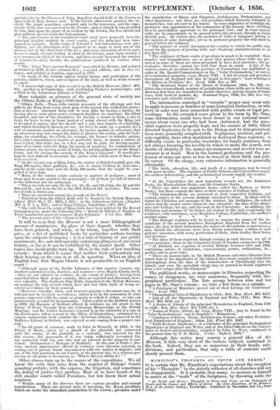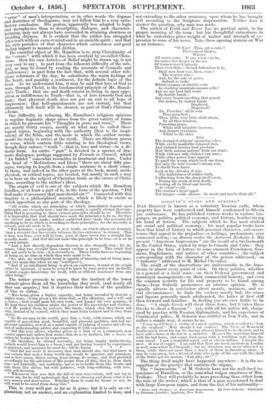HAMILTON'S THOTJGHTS ON TRUTH AND ERROR. * IT is certain that
Mr. Hamilton's expectations about the reception of his " Thoughts " by the strictly orthodox of all churches will not be disappointed. It is probable that many, as anxious as himself to arrive at the "truth" of the Scriptures, by throwing aside the • On Truth and Error : Thoughts in Prose and Verse, on the Principles of Truth and the Causes and Effects of Error. By John Hamilton, of St. Erman 's, M.A. of St. John's College, Cambridge. Published by Macmillan and Co„ Cam- bridge. "error" of men's inte7retation, or in other words the dogmas and doctrines of theologians, may not follow him to a very satis- factory conclusion. His genius, apparently less adapted to logic and metaphysics than to description, dialogue, and character- riming, may not always have succeeded in attaining clearness or avoiding dryness. It is evident that the author has struggled after truth with an earnest mind and in an amiable spirit ; and that his style partakes of that character which earnestness and good feeling impart to manner and diction. The essential object of Mr. Hamilton is to strip Christianity of the "errors" with which it has been overlaid by so-called Chris- tians. How his own Articles of Belief might be drawn up, is not very easy to say ; in part from the inherent difficulty of the sub- ject, as may be found by reading the accounts of Councils and conferences ; in part from the fact that, with several other reli- gious reformers of the day, he substitutes the warm feelings of the heart, and possibly a sentiment, for the definite logic of the head. As we understand him, it may be said that love of God to man, through Christ, is the fundamental principle of Mr. Hamil- ton's Truth ; that sin and death consist in living in open oppo- sitioii or indifference to Truth—that is, of love towards God. and man; that physical death does not put an end to all hope of forgiveness ; that hell-punishments are not eternal, but that ultimately hell itself will be cleared, as part of God's Christian scheme. One difficulty in reducing Mr. Hamilton's religious opinions to regular dogmatic shape arises from the great variety of forms in which he presents his "Thoughts in prose and verse." There are nearly thirty essays, mostly on what may be called theo- logical topics, beginning with the authority (that is the inspi- ration) of the Bible, and the mode in which the author recom- mends its study to arrive at the truth. There are thirteen pieces in verse, which contain little relating to his theological views, though they enforce "truth "—that is, love and virtue—in a di- dactic form. An entire "part" is devoted to a species of dra- matic dialogues, perhaps suggested by Friends in Council, which "An Infidel" somewhat resembles in treatment and tone. Under the head of "Meditations and Ideas," there are about fifty pas- sages, varying in length from a single sentence to a short essay. In these, and indeed in the other parts of the book, moral, meta- physical, or critical topics, are treated, but mostly in such a way as to bear on the subject of Christian truth or the errors of Chris- tians, according to the author's ideas.
The origin of evil is one of the subjects which Mr. Hamilton handles, or at least a part of it, in the form of the question, "Did God make it necessary that man should sin ?" Connected with this inquiry is a philosophical maxim, which is likely to excite as much opposition as any part of the theology.
‘.11.11 truths which are principles, or which immediately depend upon principles, are eternally true ; and the necessity-is equally eternal that any- thing that is according to those eternal principles should be so. Therefore it is impossible that God should have made the principles to be so, for they are eternal and not made ; neither could God have made the necessity for anything to be so which is according to those principles ; for the necessity is eternal, and not made to be. "For instance, a principle, or first truth, on which others are founded, that a straight line lies evenly between its two extremes,' is eternal. This is true, was true, ever will be true, even if there never was a straight line actually made. And God did not make this principle to be true—it is so in its own nature.
"And a fact directly dependent thereon is also eternally true ; for in- stance, that two straight lines cannot enclose a space.' This truth God did not make to be true—it is eternally so. These truths have no beginning of being so, no time at which they were made to be. "So, also, an intelligent being is capable of knowing and of being igno- rant (we mean this when we say intelligent'). "And if an intelligent being is given an existence, it must at its origin either be ignorant, or must be caused to know by some power not in itself; or must acquire knowledge for itself, with or without assistance from any other being."
The writer proceeds to argue, that the instinct of the lower animals gives them all the knowledge they need, (and nearly all they can acquire,) but it deprives their actions of the qualities of vice or virtue.
"Man being given a higher capacity, and being intended by God for a higher state,—being given a life from God, as His offspring, and a will and a choice,—God would undo his own work, and hinder his own purpose, if He kept these his children under the power of ills knowledge and wisdom ; or if He guided them by instinct, like beasts, which obey they know not why, instead of by counsel, which they must learn to know and to obey from choice.
"So He set man in the world, gave him a body, with senses, which are capable of perceiving good, beautiful, and pleasant qualities, and bad un- pleasant qutdities, as well as a mind capable of judging of causes and effects, and of understanding advice and comparing it with experience. "But this very advice, whether given as a hint or as a command, man cannot appreciate unless God makes him do so by instinct, like a beast, or unless he learns to do so by experience. " Ile therefore, by eternal necessity, not being taught instinctively, (which would lower him to a beast,) and not having learned by experience, is ignorant, and ignorant he must be—till he learns. * * *
"God did not snake it necessary that man should sin ; but God knew it Was certain that such a being would sin, would be ignorant and mistaken, and so love amiss, choose wrong, trust wrong, do wrong ; and God provided accordingly for the salvation of His people from all this, that is, from their sms—not hurriedly, not suddenly, not so as to bridle them like beasts and rule them like slaves, but with patience, with long-suffering, with love, with self-devotion.
"Whosoever thus sees that the fall of man was certain, will not try to excuse sin, for he will understand that sin is choosing and doing what is his own misery and destruction. Whether there be room for blame or not, he will want to be saved from doing this."
This is very well put so far as it goes ; but it is only an ex- planation, not an answer, and an explanation limited to man, and
not extending to the other creatures, upon whom he has brought evil according to the Scripture dispensation. Neither does it answer the question, why man was made. The author of Truth and Error has no poetical spirit, in the proper meaning of the term ; but his thoughtful earnestness in what he undertakes gives weight of matter and strength of ex- pression to some of his verse. Take these opening stanzas on War as an instance.
"0 War ! Thou art a curse !
Thou comest thence, Whence All curses come. If any worse can be, Its source lies deeper in the sea Of tempest-toss'd iniquity Than even thine—though fathomless it be.
Shall men from war, then, cease ?
The warrior asks—
And, for the sake of peace, Submit to tasks Which tyranny on slavish souls In crushing mountain-masses rolls ? And see our land laid waste
By hostile bands—
And every beauteous thing that graced Our homes, by violent hands Displaced, Disgraced ?
Ah, Preacher all in vain Thou preachest ; Thou little, very little shalt attain, By all thou teachest, Preaching peace, While still iniquities increase, And despots tyrannize, While to the skies Arise The trampled subjects' agonizing cries ; While swells insatiable conquest lust, And violated treaties loud proclaim How little nations nations' faith can trust ; While violence only violence can tame ; While other power none appears To quell the wrong which each one fears, But only the bold warrior's strong arm, To shield from harm.
Look at the chivalry of war, The faithfulness of soldier-faith, Unflinching from the sharp steel's scar, Daring the storm of iron death, Devoting all its blood and breath, At valour's call.
The warrior's heart appal Not hunger—cold--disease : he meets and mocks them all."



































 Previous page
Previous page